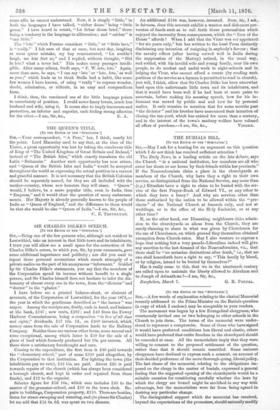SIR CHARLES DILKE'S SPEECH.
[TO THE EDITOR OF THE "SPECTATOR."] Six,—Being one of the few persons who, although not resident in Lostwithiel, take an interest in that little town and its inhabitants, I trust you will allow me a small space for the correction of Sir Charles Dlike's errors, to which you, Sir, by your comments, gave some additional importance and publicity ; nor did you omit to repeat those personal accusations which smack strangely of a private malice on the part of his anonymous " informant." Guided by Sir Charles Dflke's statements, you .say that the members of the Corporation spend its income without benefit to a single person, and Sir Charles himself does not hesitate to infer the dis- honesty of almost every one in the town, from the "dictator" and "doctor" to the "glazier."
I have before me a printed balance-sheet, or abstract of accounts, of the Corporation of Lostwithiel, for the year 1874,— the year in which the gentleman described as " the tanner" was mayor. Among the receipts are, firstly, cash in hand, and balance at the bank, £147 ; new rents, £232 ; and £40 from the Fowey Harbour Commissioners, being a composition "in lieu of all dues and rights;" dividends, £17 16s. ld., on £400 invested, which money came from the sale of Corporation lands to the Railway Company. Besides these are various other items, some annual and some exceptional, among which latter is £50 for the sale of a piece of land which formerly produced but 10e. per annum. All these show a satisfactory forethought and care.
Corning to the expenditure, the first item is £40 paid towards the " elementary school," part of some £350 paid altogether, by the Corporation to that institution. For lighting the town (the inhabitants pay no rate), £42 15s. are paid. About £50 is paid towards repairs of the church (which has always been considered a borough church, and kept in order and repaired from these funds), and £12 to the organist.
Salaries figure for £56 16s., which sum includes £40 to the master of the grammar-school, and £10 to the town clerk. Re- pairs to buildings, Corporation property, £110. There are besides, items for street-sweeping and watering, and (to please Sir Charles) let me add that £15 6s. 6d. was spent On two dinners.
An additional £184 was, however, invested. Now, Sir, I ask,_ in fairness, does this account exhibit a wanton and dishonest per of funds such as to call forth those personalities which enjoyed the immunity from consequences, which the " floor of the - House " affords? When I add that the Vicar was not appointed, "for six years only," but has written to the local Press distinctly disclaiming any intention of resigning in anybody's favour ; that the cavalry officer (after having served well in India during the suppression of the Mutiny) retired, in the usual way, and settled, with his invalid wife and young family, near his own people, to do modest and useful work in night-schools and in helping the Vicar, who cannot afford a curate (by reading such portions of the service as a layman is permitted to read in church), you will, I think, allow that Sir Charles Dilke has been somewhat hard upon this unfortunate little town and its inhabitants, and that it would have been well if he had been at more pains to ascertain, before making his amusing speech, how far his in formant was moved by public zeal and how far by personal malice. It only remains to mention that for some months past "the dictator " and his brother have announced their intention of closing the tan-yard, which has existed for more than a century,_ and in the interest of the town's sanitary welfare have refused- all offers of purchase.—I am, Sir, &c., VLNDEX.


































 Previous page
Previous page